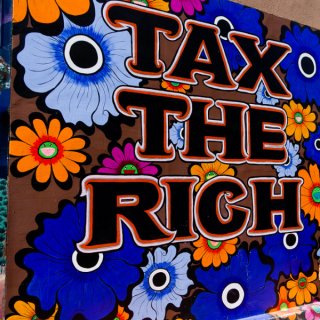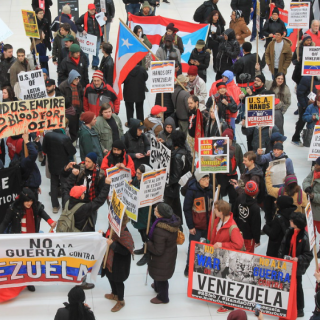Ain't No Love In The Heart
There is a reason white people can't seem to stop appropriating black culture, a reason that white American culture, despite being the dominant aspirational culture for the rest of the world, seems so boring to the people it portrays. White supremacy has paid a price for its place at the top, and that price is its people's humanity, humanity in all its beautiful and brutal, maddening and serendipitous contradictions. Contradictions that must unwaveringly be excised or, perhaps more accurately, replaced with more civilized ones. America's racists have been dying of thirst, so it's time to sing about them.
Every time Sherman's in the Super Bowl he be actin' like his shit don't stink. Moments after Richard Sherman tipped Colin Kaepernick's pass to prompt a game-sealing interception, he tipped one of white America's greatest contradictions, that of the graceful winner, which Twitter promptly intercepted, complete with covert and overt racist social media updates and litany of defending posts in the black blogosphere. The liberal consensus, then reinforced on ESPN, seems to be that though Richard Sherman displayed poor sportsmanship, that by no means relegates him to “thug” status, considering his Stanford degree, community work, clean arrest record, and articulate press conference afterward. Unchallenged in this consensus though, are the norms of sportsmanship itself.
Our norms on sportsmanship are seen as sacrosanct, an odd exaltation for mere bread and circuses designed to placate the masses, but sport in the modern context has always served a political function, a morality play for its adherent culture. To understand their norms, one has to understand their origin.
Before the birth of behemoth professional sports leagues, way back in the 19th team sports were played by amateurs, rich white male amateurs who suddenly, thanks to the miracles of industrial production, had all this free time on their hands. And yet, as these games began to attract crowds, they began to take on additional significance. They weren't just games, they were morality plays for (white) national identity. At the same damn time though, these games had to be frivolous.
These games weren't preparations for war ala the Athenians or Spartans; they were congenial affairs among aristocrats. Enter black people stage right to mess everything up.
For black people, and people of color around the Western hemisphere, historically, the amateurism of sport is a luxury they have been ill able to afford, because of that whole white supremacist capitalism thing. Though the appeals of sport transcended racial and class lines, the norms not so much. Former IOC commissioner and noted white supremacist Avery Brundage can champion the ideal of amateurism all he wants, sports for people of color has always primarily been a professional enterprise, a way to make a living, a way to lift oneself and one's family out of poverty, from Jim Thorpe on through to today.
This difference in provenance would then, inevitably, have its effect on the cultural mindset players bring to their respective sports. We in the same league, but we don't ball the same. But for further elucidation, I will defer to Sherman himself. In a press conference last Wednesday, upon being asked a question about how his growing up in Compton affected his outlook, he said “It really gave me a great base to understand that when you're doing something, when you're going out there playing the game, that you didn't come from anything. Where you came from, not a lot of people eat every night. People don't eat every night. There's crime out there. Kids who are born into impoverished situations didn't choose those lives, so you really take every moment, and every play and you understand that it has great magnitude, and you take nothing for granted, you take no blade of grass for granted.”
Upon first glance, his response appears to be little more than the standard athlete-from-troubled-circumstances narrative. But his framing reveals an ethos that is fundamentally at odds with traditional (white) ideas about sportsmanship, about athletic contests at the end of the day being a sporting affair among gentlemen, about it being just a game.
And of course, this isn't just any sport, this is football, America's ritual celebration of violence, a sport that is, for all intents and purposes, quite literally war in the minds of the people who play it. And while for much of white America, this violence is an indulgence, 53-person fight club, an affectation that can be just as easily discarded as its spectators, coaches, sportswriters, et al retreat to the safe quiet of their suburban homes, for a great deal of the black athletes who play professional football, this violence is a direct mirror of the everyday violence of their surroundings growing up.
And of course, this isn't just any league, this is the NFL, the league with the weakest players union, an imperial behemoth that places player safety and job security at a minimum, where anyone without a franchise tag can be cut any year and receive nothing more than a “thank you for your service,” a dynamic that makes life in the NFL seem not all too dissimilar to life under an authoritarian dictatorship. Once again, Mr. Sherman has insight, this time from a column he wrote for SI.com five
“When a veteran gets cut, we may discuss it privately amongst ourselves, but there’s no ceremony, no coach’s acknowledgment of the missing man. I never saw Mike collect his things from his locker, and I didn’t get to shake his hand. The next morning, it’s as if no one had ever occupied the locker that once read No. 26...[Teammates] become indispensable parts of your life. Yet to identify an indispensable part on a football team is to concede defeat in the event that man’s football mortality catches up with him. Every man can be replaced.”
Whether or not Sherman intended to do so, in that passage he reveals the brutality not just in the sport, but in the way the NFL operates, the inhumanity at its core. This orphanage they call professional football is quite the routine. Taken through all these prisms, the idea Richard Sherman did something wrong in his conduct after the play and after the game, that he deserved to be penalized is downright illogical. And yet, fined he was by the NFL last Monday.
The irony, though, is that Richard Sherman in two minutes has done more for the NFL's brand than a thousand press releases and canned media segments could have ever done. Already, the narrative going in has coalesced around “Peyton Manning vs. Richard Sherman,” a match-up with legitimate football intrigue, but also one with exponentially more social significance.
Nobody has been a more reliable brand ambassador for the NFL in the past 15 years than Peyton Manning, a man who represents all that is right and good about the National Football League and traditional American values, the platonic form of whiteness, in more ways than intended. The going line about Peyton Manning is that he is the dominant quarterback in the league because of his intelligence, his attention to detail, his authoritative presence and, most importantly, his hard work.
Nobody is ever going to tell Peyton Manning that he didn't build it. Often omitted in this assessment is the privilege Peyton Manning received growing up as the son of a 14-year NFL quarterback.
Uncharitably, one could say that Manning just followed his daddy into the family business. And here we see the lies at the heart of white American meritocracy. Greatness is singularly forged through passion and grit alone, and yet the people at the top almost always seemed to have had some special help getting there.
Truly then, there could not be a more fitting foil for Peyton Manning than Richard Sherman. Far from being a classless thug, Richard Sherman is the embodiment of everything white conservatives say they want from black America. The rare product of a two-parent household in Compton, he kept his nose clean, worked hard, didn't blame white people for his problems, and valued his education, and give back to his community. More cloyingly for America's racists, his success in the NFL can not be written off due to his “natural athleticism.” He studies as much film as Peyton Manning. And yet, all that isn't enough, because nothing is ever enough.
All grandiloquence aside though, the Super Bowl is a competition, and I want one side to win.
Indeed, sporting events can and have been a theater of resistance. One of the reasons for their importance to the black community is that they provide the rare opportunity to quite literally beat white people at their own game. I used to marvel in mystery about recounts of black people of yore celebrating in the streets over Joe Louis's or Jesse Owens's victories, but now I understand. Nothing against Peyton, but I hope Richard Sherman gets 6 interceptions on Sunday and yells “Free Mumia” in the postgame.
The struggle of Richard Sherman is the struggle for dignity, the struggle to be black and be human with all its attendant contradictions, even though he is not really a paradoxical figure. This justice of humanity is the third part of the freedom struggle, alongside political and economic justice, and while we are far from achieving the first two, there's no reason not to also take up the third. Come Sunday,
it'll be time to watch that black boy fly.



